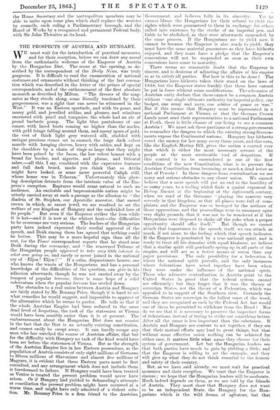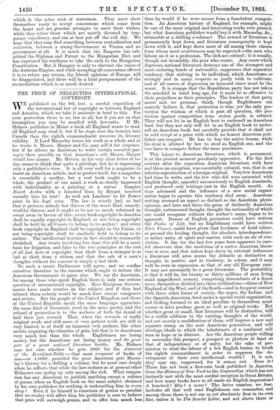THE PROSPECTS OF AUSTRIA AND HUNGARY.
WE must wait for the introduction of practical measures, and for their reception, before we can draw any moral from the enthusiastic welcome of the Emperor of Austria by the Hungarian Diet. The scene at the opening, as de- scribed by the correspondent of the Daily News, was truly gorgeous. It is difficult to read the enumeration of national costumes and ornaments without thinking of the last corona- tion which was described in the letter of the prince of special correspondents, and of the enthronement of the first absolute monarch as described by Milton. " The dresses of the mag- nates as they strode along, some literally burdened by their gorgeousness, was a sight that can never be witnessed in the West." It was an Eastern spectacle, and with its gems. and massy gold, and jewelled attilas, and plumes, and scimitars encrusted with pearl and turquoise, the whole had an air of proud barbaric pomp. The light blue pantaloons of one comer, with laced boots coming no higher than the ancles, with gold fringe falling around them, and massy spurs of gold, the vest of thick light grey watered silk, studded with antique precious stones set in enamel, the large dark velvet mantle with hanging sleeves, heavy with sables, and kept on the shoulders by a chain of rings so large that they might have been prized by the Incas, the low velvet bonnet with a broad fur border, and aigrette, and plume, and Oriental sabre,—all this, I say, combined with the expressive features and full dark beard, made you think that so Attila might have looked, or some more powerful Caliph still, whose home was in Teheran." Unfortunately this glow- ing description detracts from the intrinsic value of the Em- peror's reception. Raptures would come natural to such an audience. An excitable and impressionable nation might be utterly carried away at such a passage as the allusion to " the diadem of St. Stephen, our Apostolic ancestor, that sacred crown in which, as rarest jewel, we are resolved to set the welfare of our kingdom of Hungary and the undivided love of its people." But even if the Emperor strikes the iron while it is hot—and it is now at the whitest heat—the difficulties to be overcome are very serious. The leaders of the Hungarian party have indeed expressed their cordial approval of the speech, and Deak among them has agreed that nothing could be better. This may be a more hopeful sign than all the rest, for the Times' correspondent reports that he stood near Deak during the ceremony, and " the renowned Tribune of the Hungarian people appeared to take very little interest in what was going on, and rarely or never joined in the national cry of Eljen! Eljen !' " If a calm, dispassionate hearer, one who knows the wants of the Hungarians, and has a personal knowledge of the difficulties of the question, can give in his adhesion afterwards, though he was not carried away by the tempest of popular fervour, there is some hope of a solid substratum when the popular fervour has settled down.
The obstacles to a real union between Austria and Hungary are fairly stated by Mr. Bonamy Price, though it is hard to see what remedies he would suggest, and impossible to approve of the alternative which he seems to prefer. He tells us that if the whole Austrian Empire had been reduced to the same dead level of despotism, the task of the statesmen at Vienna would have been sensibly easier than it is at present. The embarrassment about the Hungarian Diet does not consist in the fact that the Diet is an actually existing constitution, and cannot easily be swept away. It can hardly escape any man who has watched the course of Austrian affairs, that but for the difficulty with Hungary no task of the kind would have been set before the statesmen of Vienna. But as the strength of the Austrian Empire lies in her Eastern possessions, as the population of Austria consists of only eight millions of Germans to fifteen millions of Slavonians and almost five millions of Magyars, it is evident that these Eastern parts must be first consulted, and any arrangement which does not include them is foredoomed to failure. If Hungary could have been treated as Venice is treated the present problem would never have arisen. Or if Hungary had yielded to Schmerling's attempts at conciliation the present problem might have occurred at a worse time, and might have only admitted of a violent solu- tion. Mr. Bonamy Price is a firm friend to the Austrian
Government, and believes fully in its sincerity. Yet he cannot blame the Hungarians for their refusal to yield the rights which were guaranteed to them in exchange for others called into existence by the stroke of an imperial pen. and liable to be abolished, as they were afterwards suspended, by the same process. If the Hungarians are to yield now, it cannot be because the Emperor is also ready to yield; they must have the same material guarantees as they have hitherto enjoyed, and they must have a pledge that the Emperor's concessions will not be suspended as soon as their own concessions have come to maturity.
There seems no reasonable doubt that the Emperor is sincere, and is desirous of adjusting the affairs of his empire so as to satisfy all parties. But how is this to be done ? The Hungarians have hitherto taken their stand on the laws of 1848, but the Emperor states frankly that these laws cannot be put in force without some modifications. The advocates of Austrian unity declare that there cannot be a common Austria without " one single ultimate authority for imperial policy, one budget, one army and navy, one arbiter of peace or war." But if this means that Hungary must be represented in a national Parliament at Vienna, or that the German Crown Lands must send their representatives to a national Parliament at Pesth, there is little chance of our living to see a common Austria ? We must ask these partizans of a strong government to remember the dangers to which the existing strong Govern- ments expose the Continental nations. Hungary has hitherto voted the money for her army every three years, and this vote, like the English Mutiny Bill, gives the nation a control over that which is either the most necessary servant of the people or the most serviceable tool of despotism. If this control is to be surrendered as one of the first conditions of the new Constitution, what is to prevent the Austrian Constitution from becoming as much a dead letter as that of Prussia ? In these dangers from centralization we see many and serious obstacles to any closer union. We cannot believe that a mere speech will put an end to the hostility of so many years, to a feeling which finds a quaint exponent in Bishop Burnet at the beginning of the eighteenth century, when we read of the Germans playing the masters very severely in that kingdom, so that all places were full of com- plaints, and the Emperor was so besieged by the authors of those oppressions, and the proceedings were so summary upon very slight grounds, that it was not to be wondered at if the Hungarians were disposed to shake off the yoke when a proper opportunity should offer itself." But though we cannot attach that importance to the speech itself, we can attach as much, if not more, to the feeling which that speech indicates. If the Emperor is penetrated by a true national spirit, and is ready to treat all his domains with equal kindness, we believe that a similar spirit will gradually spring up in all parts of the empire, and will act as a better means of union than any paper provisions. The only possibility for a federation is where the national spirit prevails, and the only instances where federations have acted together have been when they were under the influence of the national spirit. Those who advocate centralization in Austria point to the United States in proof that the federal system cannot act efficiently ; but they forget that it was the theory of sovereign States, not the theory of a Federation, which was appealed to in support of the Southern view. Certainly the German States are sovereign in the fullest sense of the word, and they are recognized as such by the Federal Act. but would one of them be permitted to withdraw from the Bund ? Nor do we see that it is necessary to preserve the imperfect forms of federations. instead of trying to strike out something better. After all the name is less important than the substance. If Austria and Hungary are content to act together, if they see that their mutual efforts may lead to great things, but that without some effective union nothing can be achieved for either race, it matters little what name they choose for their system of government. Let but the Hungarian leaders see that both parties have much to gain by yielding a little, and that the Emperor is willing to set the example, and they will give up what they do not think essential to the honour and safety of their country.
But, as we have .said already, we must wait for practical measures and their reception. We trust that the Emperor is sincere ; we hope that the Hungarian leaders will be moderate. Much indeed depends on them, as we are told by the friends of Austria. They must show that Hungary does not want to be an independent State, the Hungary for the Hun- garians which is the wild dream of agitators, but that
which is the sober wish of statesmen. They must show themselves ready to accept concessions which come from the heart and are genuine attempts to meet their wishes, while they refuse those which are merely dictated by tem- porary expediency, and can at best put off the evil day. We hope that they may find something between centralization and confusion, between a strong Government at Vienna and no government at all. It is much that the Emperor has sub- mitted the Diploma and Patent to the Hungarian Diet, and has expressed his readiness to take the oath to the Hungarian Constitution. But if Hungary is only to obstruct the union of the Austrian Empire, and while accepting all concessions offered it is to refuse any return, the liberal opinions of Europe will be disappointed, and there will be a fatal postponement of the reconciliation_which is so much desired.



































 Previous page
Previous page